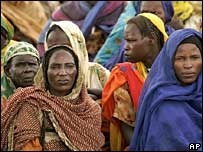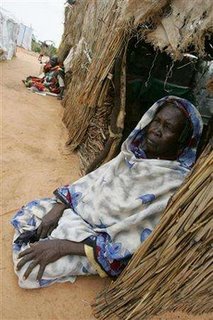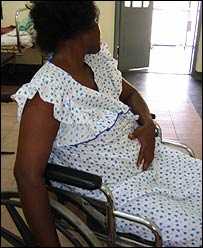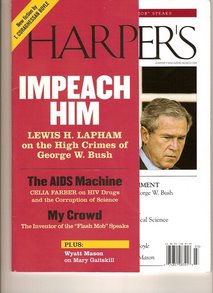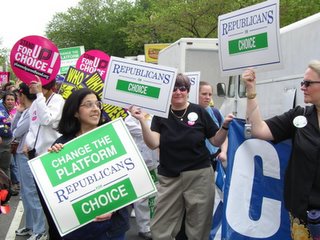Undercovered News: South Dakota Travel Ban, Rape in Darfur, Bush to Shut Down AmeriCorps
Facts and Figures on U.S. Women
Population: As of July 1, 2004, there were 149.1 million females in the United States. There were 144.5 males.
Education: 31 percent of women ages 25 to 29 years had attained a bachelor's degree or higher in 2004, which exceeded that of men in this age range (26 percent).
Businesses: There were 6.5 million women-owned businesses in 2002, up 20 percent from 1997.
Earnings: Women 15 and older, who worked full time, year-round, earned 77 cents for every $1 their male counterparts earned in 2004. This amount is up from 76 cents for every dollar in 2003.
Voting: 65 percent of female citizens reported that they voted in the 2004 presidential election, which was higher than the 62 percent of their male counterparts who cast a ballot.
Military: As of Sept. 30, 2004, women made up 15 of the armed forces. In 1950, women comprised fewer than 2 percent.
Source: US Census
General
*March is Women's History Month, a federally recognized, nationwide celebration that encourages all Americans to reflect on the ways in which women have shaped U.S. history. But how did this celebration come to be, and why is it held in March?
Cnn.com
*Women of color in the sciences are celebrated in a new book that aims to inspire the next generation. But educators and some of the featured scientists worry that recent gains for black female scientists are vulnerable to unraveling.
Source: Women's eNews
*Effa Manley became the first woman elected to the baseball Hall of Fame when the former Newark Eagles co-owner was among 17 people from the Negro Leagues and pre-Negro Leagues chosen Monday by a special committee.
Source: AP
*Without any public notice, the US Environmental Protection Agency has rewritten its proposed rule on human experiments to authorize chemical testing on fetal tissue, according to Public Employees for Environmental Responsibility (PEER). The change will allow pesticide and chemical companies to conduct experiments on aborted fetuses to buttress lobbying efforts for relaxation of federal regulation and increases in allowable dosage levels for its products.
Source: Public Employees for Environmental Responsibility
Politics
*President Bush, who embraced AmeriCorps as part of his "compassionate conservative" agenda in 2001, now wants to shut down a part of the national service program that his administration has deemed "ineffective." Beginning next year, the White House would reduce funding for the AmeriCorps National Civilian Community Corps from $27 million to $5 million with the goal of closing it down, according to the president's budget. About 81 full-time staff members would lose their jobs.
Source: Washington Post
*Bucking rising sentiment against illegal immigrants, Congress recently voted to increase protections for undocumented immigrants trapped in abusive relationships or sex-trade networks. President Bush signed these amendments into an existing law in January, giving abused undocumented women greater options for obtaining legal status and escaping perilous circumstances, according to two attorneys who spoke Friday in Sacramento at a workshop for social workers and law enforcement representatives from around the state.
Source: Sacramento Bee
*The Bush administration will oppose a U.N.-backed resolution calling for the creation of a council to expose the world's worst human rights abusers, John R. Bolton, the U.S. ambassador to the United Nations, said Monday.
Source: Washington Post
Economic Justice
*For the second straight year, personal savings have been in the red, a phenomenon that has only happened once before, at the height of the Great Depression. Research conducted by the Economic Policy Institute shows that the indebtedness of US households has risen nearly 36 percent over the last four years. As a result, the gulf between the "haves" and "have nots" is reaching crisis proportions.
Source: In These Times
In The Courts
*A 20-year-old legal fight over protests outside abortion clinics ended Tuesday with the Supreme Court ruling that federal extortion and racketeering laws cannot be used against demonstrators. The 8-0 decision was a setback for abortion clinics that were buoyed when the 7th U.S. Circuit Court of Appeals kept their case alive two years ago despite the high court's 2003 ruling that had cleared the way for lifting a nationwide injunction on anti-abortion leader Joseph Scheidler and others.
Source: AP
*Senior Food and Drug Administration officials must testify about the federal agency's failure to decide whether a controversial emergency contraceptive pill may be sold without a prescription, a federal judge in Brooklyn ruled late Friday. The decision by Magistrate Viktor Pohorelsky came in response to FDA legal efforts to keep secret the agency's discussions and correspondence about the pill, called Plan B.
Source: Newsday
Reproductive Rights
*Stay out of South Dakota. That's the message one pro-choice group has for its supporters. The Wisconsin-based Women's Medical Fund is calling for a boycott of South Dakota tourism if Governor Mike Rounds signs a bill banning most abortions. It's the state's second largest industry, but South Dakota tourism could see a drop in visitors who don't support a ban on abortion.
Source: Keloland.com
*Abortion opponents say they are babies. Pro-choice activists call them fetuses. Whatever the label, Kay Frost says, the tiny beings put on quite a show during ultrasounds at the AA Pregnancy Help Center -- an anti-abortion facility in Lexington. Across the country, anti-abortion activists are now using medical technology to persuade women to carry their pregnancies to term. Some abortion-rights activists have criticized the use of sonograms, saying they put inappropriate pressure on women. "It's a manipulative tool," said Ginny Copenhefer, a former lobbyist with the Kentucky Religious Coalition for Reproductive Choice. "I don't think it's fair to heap guilt on them because they feel they have to terminate a pregnancy. That's just the most cruel form of abuse that I can imagine."
Source: Lexington Herald-Leader
*The [New York] Legislature on Monday supported a new bill that would allow pharmacists to offer the "morning after" contraceptive pill to girls and women without prescription. Lawmakers said the new version addresses most of the concerns that led to Gov. George Pataki's veto of an earlier bill.
Source: Newsday
International
*If you are a woman in the Darfur region of Sudan who has been raped and you want to lay a charge, it is virtually certain that legal officers will automatically reduce your allegation to one of assault. If you persevere with your rape accusation, you will be told to do the impossible and provide four male witnesses to support your charge. As a result, sexual violence goes almost totally unpunished and is one of the biggest violations of women's rights in Darfur. It is why members of my organisation, the African Women's Development and Communications Network, FEMNET, and of other women's rights groups in Africa have high hopes that the new International Criminal Court in The Hague will be able to change the situation.
Source: Institute for War & Peace Reporting
*A small but burgeoning group of young Italians are turning to Catholicism with new fervor, suggesting a reversal of Catholicism's decades-long decline in Italy. Sister Cristina is one of 550 young Italian women who joined the country's 7,500 cloistered nuns in 2005 - a dramatic increase from the 350 who became nuns in 2003. Vatican officials say the sudden rise in Italian monasticism mirrors a resurgence in Catholicism among young Italians during recent years.
Source: Christian Science Monitor
*A record number of women are serving in parliaments worldwide, but they only account for just over 16% of all MPs.
Source: BBC
*The world is beginning to understand that integrating women and girls into the life of a nation is the surest path to economic growth and development, a top U.N. official told an annual meeting that analyzes the global status of women.
Source: Reuters
*In Africa, the increased participation of women in politics is helping legislatures look more like their own societies and less like exclusive men’s clubs. The conclusions were presented in a study by the Geneva-based Inter-Parliamentary Union. It’s participating in a series of discussions during the annual meeting of the 50th Session of the U-N Commission on the Status of Women, C-S-W, in New York City.
Source: VOA
*A mysterious source was feared to have bought every copy of a best-selling novel that caused sensation and scandal in Saudi Arabia. Banat al Riyadh, or the Girls of Riyadh, written by Rajaa al Sanea, about the lives of four well-to-do women in the Saudi capital, was on exhibit with other Dar al Saqi publications at the Riyadh International Book Fair. However, a representative for the publishing house denied the book had sold-out.
Source: Asharq Alawsat

